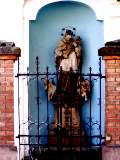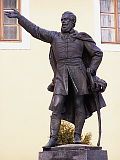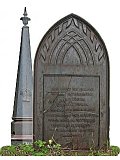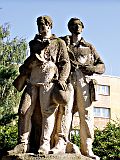| | I | | | | | |  The
town is situated in the Rožňava Fold in the valley of the Slaná River,
under the southern foothills of the Volovské Mountains. Rožňava emerged
as a miners' settlement with golden, silver, and copper mines. The
first written mention of the town dates back to 1291. The first
municipal rights were granted in 1340, the town became a tributary town
in 1382, and it gained full recognition as a free royal town in 1410.
Turkish raids in the 16th century contributed to the decline of mining.
Today, Rožňava is a pleasant town with excellent opportunities for
nature and history lovers. The
town is situated in the Rožňava Fold in the valley of the Slaná River,
under the southern foothills of the Volovské Mountains. Rožňava emerged
as a miners' settlement with golden, silver, and copper mines. The
first written mention of the town dates back to 1291. The first
municipal rights were granted in 1340, the town became a tributary town
in 1382, and it gained full recognition as a free royal town in 1410.
Turkish raids in the 16th century contributed to the decline of mining.
Today, Rožňava is a pleasant town with excellent opportunities for
nature and history lovers. | | |
 | | | 
 |
KLIK
FOTO
= INFO+

| 
 | |
Chapel of St. John Nepomuk.
In hte second half of the 18th Century, a row of medieval shops
(kramiky) next to the watchtower was extended by a small chapel. The
chapel houses a life-size statue of St. John Nepomuk carved in the
rococo style. On the side cornices of the chapel there are two
statuetes of angels. The one on the left side with his finger in his
mouth symbolizes the patron of confession secrets. The one on the right
is a replica of the original that perished. The Saint in a sligtly
twisted posture in the black and white robe holds a palm spray and a
cross on the left side of his chest. His head in a black hat is
slightly bent towards the cross. Above his head there is a glory
with four stars. ........... | | |  | | The statue of Lajos Kossuth
/1802 -1894/ - a leader of the 1848 revolution and a member of the
Hungarian parliament - in a above-life size (2.7m). It was
erected in 1907 on the Banikov square. It was removed during the
first Czechoslovak republic (1918-1938). It reapeared during the
Horthy's occupation of the southern parts of Slovakia. In 1945 it was
depositied in a museum. It was re-erected in the first week of February
2004 in the public space on the side of the Museum of Mining. The fund
for restoration of Hungarian memorials contributed 520,000 Slovak
crowns. The brass statue was cast by a Hungarian sculptor József Róna. ............ | | |  | | Old cast-iron tombstones
from the cemetery of Roznava nowadays placed in teh yard of the Museum
of Mining were cast by the skillful smiths and casting masters from
Chyžna Voda (Lubeník) and Dobsina. One can find tomstones of different
types, such as crosses, gothic arches, and cones, and with different
motifs, such as sprays, weeping willow, angels, and skull.
One of the oldes is the tomstone of Jozef Szontágh from 1831 and Jána
Colinási from 1808. ........... | | |  | | Liberators' Memorial
- limestone sculrpue consisting of three figures: a Red Army soldier, a
woman with a child in her hands, and a man. It was sculpted by Vojtech
Loffler. In 1985 it was placed in front of the Watchtower on the
Miners' square. In 1992 it was moved to its present place in front of
the elementary school on Zlata street. ........ | | |  | |
| | |  | |
| | |  | |
| | |  | |
| | |  | |
| | |
down
retep.sk (c) 2002 - 2011
| | | |
|